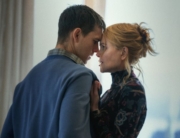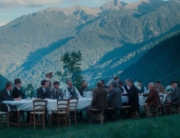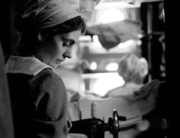Hyun Jae (Jamie Chung) is just a naive American teenager in June 1994, marking her New Mexico high school graduation with a class ring, and rebelling against her immigrant Korean parents. She sneaks out to a bar with a fake ID, despite wearing braces that make her look younger. A simple flirtation with a cute guy (Scott Mechlowicz) flashing a (fake) firefighter’s badge leads to her drugged kidnapping by a formidable operation working out of a local warehouse storage locker. There she’s chained in a cell with a long line of other girls. (Giving the truth to the most extreme warning a parent can give a daughter.)
The brutal organized crime ring is run by moonlighting law enforcement officer Bob Gault (Beau Bridges, in disconcerting corrupt good ole boy mode), who casually murders cops who have come across one of the outfit’s dead castoffs. (Gault tracked her body down by the electronic bracelet surveillance tags he officially gets at a bargain price.) Yet director Megan Griffiths has made less than the usual action flick about criminals and lurid sex than a sobering look at the brisk efficiency of the sex work infrastructure and the struggle to retain one’s humanity while imprisoned in it.
Solidarity is not even a given among women in the trade. Tantoo Cardinal plays a tough, business-like nurse who gives the girls assembly line daily medical check-ups, pregnancy and STD tests, and injections to control them. (Not clear if AIDS was considered an issue then.) When Hyun manages to escape a party one night, a shocked group of suburban housewives passively believes her handler when he says he’s an undercover cop recapturing her.
Hyun is marketed as a 13-year-old of any Asian nationality that appeals to clients, renamed Eden, put in pigtails, and ordered to talk pidgin English. But when she is paired with 15-year-old Priscilla (Jeanine Monterroza), she’s spurred to prove she can take on supervisory responsibilities in order to try and protect her. (A nemesis named Svetlana and burly thug Ivan hearken to more stereotyped images from TV and other movies.)
As in her The Off Hours (2011), Griffiths is best at the intimate scenes between marginalized individuals feeling out complicated relationships. Hyun gradually manipulates her young cokehead jailer, Vaughan (Matt O’Leary), first by cagily showing her financial smarts when a frat party tries to stiff him, then by convincing him she’s aged out for customers. Not only is Chung’s performance convincing as she transforms from a shy teenager to automaton to madam, but her self-realization at how hardened she has become over the course of two years is palpably moving. (Despite Vaughan’s cruelty, O’Leary makes a sympathetic, yet pitiful cog.) As his drug habit gets worse and he reveals more about the organization, let alone its violence, Hyun is exceptionally smart and daring in how she grabs rescue opportunities when she sees Priscilla later involved in the baby-selling branch of the evil enterprise (seems there’s nothing it won’t do).
Even as she learns the wide and nefarious extent of the crime ring, the potential of the Internet as a profit center is only introduced as something yet on the horizon. Its international reach is hinted by forged passports and frequent threats to send the girls abroad, as shown in the best investigative documentary I’ve seen on this subject, Mimi Chakarova’s The Price of Sex. While Marco Kreuzpaintner’s Trade (2007) was inspired by efforts to rescue victims imported into the States, Eden is based on the real experiences of Chong Kim in Texas, who told her story in a chapter of Not in My Town: Exposing and Ending Human Trafficking and Modern Day Slavery by Dillon Burroughs and Charles Powell. She is currently working on her own memoir. In the meantime, this tribute to her courage gives unusually poignant insight into those caught up in sex trafficking.







Leave A Comment